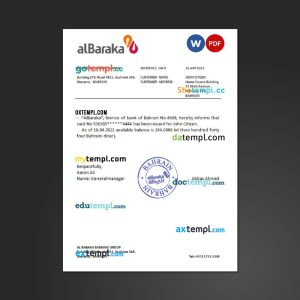A reference letter, also known as a recommendation letter, is a document written by someone who knows an individual professionally or personally and can attest to their character, abilities, and achievements. The purpose of a reference letter is to provide insight into the applicant’s qualities and experiences to support their job application, academic admission, or other opportunities. Reference letters can be written by former employers, colleagues, teachers, mentors, or other individuals who have a positive impression of the applicant.
What does a reference letter include?
A reference letter typically includes the following information:
- Introduction: The letter should start with an introduction that explains the writer’s relationship to the applicant, how long they have known the applicant, and in what context.
- Description of the applicant’s skills and abilities: The letter should provide specific examples of the applicant’s skills and abilities that are relevant to the opportunity they are applying for. This can include qualities such as leadership, teamwork, communication, problem-solving, and adaptability.
- Description of the applicant’s achievements: The letter should highlight any achievements or accomplishments of the applicant that are relevant to the opportunity they are applying for. This can include academic accomplishments, professional accomplishments, or personal achievements.
- Personal qualities: The letter should describe the applicant’s personal qualities, such as their work ethic, integrity, and character.
- Comparison with others: The letter may compare the applicant’s skills, achievements, or personal qualities with those of others who have applied for the same opportunity.
- Contact information: The letter should include the writer’s contact information, including their name, position, and phone number or email address so that the recipient can follow up if necessary.
It is important to note that the specific content of a reference letter will depend on the context of the opportunity and the relationship between the writer and the applicant. However, a well-written reference letter should provide a detailed and objective assessment of the applicant’s abilities and qualifications.
Types of the reference letters
There are several types of reference letters that can be written, depending on the purpose and context of the application. Here are some of the most common types of reference letters:
- Employment Reference Letter: This type of reference letter is written by a former employer or supervisor and is used to provide insight into the applicant’s work experience and skills. It typically includes information about the applicant’s job responsibilities, performance, and achievements.
- Academic Reference Letter: This type of reference letter is written by a teacher, professor, or academic advisor and is used to provide insight into the applicant’s academic achievements, skills, and potential. It typically includes information about the applicant’s academic performance, research abilities, and personal qualities.
- Character Reference Letter: This type of reference letter is written by someone who knows the applicant personally and can attest to their character, integrity, and personal qualities. It is often used for job applications or for legal proceedings, such as court appearances.
- Professional Reference Letter: This type of reference letter is written by a colleague or business associate and is used to provide insight into the applicant’s professional skills and accomplishments. It typically includes information about the applicant’s work history, job performance, and contributions to the organization.
- Personal Reference Letter: This type of reference letter is written by a friend or family member and is used to provide insight into the applicant’s personal qualities, such as their character, values, and interests. It is often used for college applications or for personal matters, such as immigration proceedings.
The specific content and format of each type of reference letter will vary depending on the purpose and context of the application.
In conclusion, a reference letter is a powerful tool that can significantly enhance an individual’s chances of success in their pursuit of a job, academic admission, or other opportunities. A well-written reference letter can provide insight into an applicant’s skills, achievements, and personal qualities, and can serve as a valuable endorsement of their abilities.
There are several types of reference letters, including employment reference letters, academic reference letters, character reference letters, professional reference letters, and personal reference letters. Each type of reference letter serves a different purpose and requires a different format and content.
When writing a reference letter, it is important to be specific and objective and to provide concrete examples that demonstrate the applicant’s abilities and achievements. It is also important to consider the context of the opportunity and to tailor the letter to the needs and requirements of the recipient.
Overall, a well-written reference letter can help an applicant stand out from the competition and can provide valuable insight into their potential for success in their chosen field.
If you want to explore more about the reference letters click here: reference letter
